ANASTU Laboratory
About the Lab:
The Laboratory of the National University of Agricultural Sciences and Technology, Afghanistan, is among one of the laboratories of the Agricultural faculties of Afghanistan, which can conduct practical experiments in soil and plant with the help of modern machinery, chemicals, and well-experienced technicians.
Behalf of establishment of the laboratory of the National University of Agricultural Sciences and Technology in Afghanistan, practical experiments of soils and plants were carried out to enhance the academic level of the students. The need for the establishment of an equipped laboratory was imminent, resulting in the establishment of a modern laboratory at the National University of Agricultural Sciences and Technology, in accordance with the university's leadership and planning. Financing emerged and the construction of the building was completed during its first five years and was ready to reap the benefits. Currently, researchers and students can produce positive results with laboratory practice to study the varieties of soil and the growth of plants in the affected soils.
Vision:
The laboratory of the National University of Agricultural Sciences and Technology of Afghanistan is striving to create an academic and internationally standardized educational environment that will advance Vitelline into such a professional cadre of practice for the community concerned. Deliver service in accordance with international standards.
Objectives:
The Laboratory Department of the National University of Agricultural Sciences and Technology, with the sophisticated and sophisticated machine tools, seeks to expand the scope of research and thus play a vital role in strengthening the national economy, as the fields based on research and testing waste. Decreases and yields improve.
Message:
The Laboratory Department of the National University of Agricultural Sciences and Technology of Afghanistan is determined to establish a competent laboratory with advanced and contemporary missionaries to boost the country's national economy.

Asadullah (Hamdard), son of Haji Hamidullah, in the year 1991 Kandahar province 4th district in Joy Shah village opened his eyes to this mortal world. he completed his first religious studies in his villages masjid Mullah Imam. And Stated elementary School in Timor Shahe primary School, and high school in Mahmood Tarazi High School and successfully completed high School in there. In (2011) gave Kankor Exam, after attending Kandahar University Agriculture. In (2016) got bachelor degree of agriculture as agronomist.
During studies he was teaching in Ariana Private Academy, and Shams London Private Academy. After graduation got a job as a team leader in (HRDA) Ingo. Due to his interest in Agricultural Laboratory. In the same year (2016) got the job of Agricultural Laboratory Technician. In (2017) Mr. Hamdard beside of internal capacity building training he participated in international training in (IISS) Institute in Bhopal India for fifteen days in which he received a professional training in soil analysis. The workshop was very successful and efficient for him and his country.
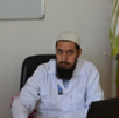 Allah Dad (Noori), son of Mohammad Nabi, Born 1990 in Kandahar province Panjwai District in Nakhoni village. He studied his first religious studies in his village’s masjid mullah Imam and mla Mansur Madrasa. And graduated from high school in ( Zahir Shah High School) In (2010) gave Kankor Exam in the same year. After attending Kandahar University Agriculture Faculty. Got bachelor degree in (2014) form Department Agronomy Faculty of Agriculture. Mr. (Noori) during the studies He was a teacher in [Reggi Kalacha Elementary School]. Due to His interest in Agricultural Lab working he got a job in Afghanistan National Agriculture Sciences and Technology University in (2014) as Agricultural Laboratory Technician. In (2016) Mr.Noori participated in a three month training in (IARI) university New Delhi India for soil analysis.
Allah Dad (Noori), son of Mohammad Nabi, Born 1990 in Kandahar province Panjwai District in Nakhoni village. He studied his first religious studies in his village’s masjid mullah Imam and mla Mansur Madrasa. And graduated from high school in ( Zahir Shah High School) In (2010) gave Kankor Exam in the same year. After attending Kandahar University Agriculture Faculty. Got bachelor degree in (2014) form Department Agronomy Faculty of Agriculture. Mr. (Noori) during the studies He was a teacher in [Reggi Kalacha Elementary School]. Due to His interest in Agricultural Lab working he got a job in Afghanistan National Agriculture Sciences and Technology University in (2014) as Agricultural Laboratory Technician. In (2016) Mr.Noori participated in a three month training in (IARI) university New Delhi India for soil analysis.
The Current status of the laboratory

The central laboratory of the National University of Agricultural Sciences and Technology of Afghanistan is located on the second floor of the teaching block, divided into four different departments based on current requirements. Depending on the current need and condition of the laboratory, the National University of Agricultural Sciences and Technology of Afghanistan has four laboratories and one reservoir, out of which two laboratories are active (Agronomy and Soil Education), two laboratories are non-functional (Animal). Sciences and Horticulture) and the Plant Protection Laboratory (Plant Disease Lab) are under construction. The laboratory has the following facilities.
|
Agronomy Laboratory |
Chemical storage |
Client waiting area |

|
Horticulture Laboratory
|
Soil analysis laboratory
|
Plant pathology Laboratory
|

Agronomy Laboratory:
This laboratory is affiliated with the Division of Agronomy. Equipped with modern machinery, Can perform various soil and plant tests. Students and researchers can study different types of plant growth in different types of soils.


(AAS) Atomic absorption spectrophotometer
Soil lab
This lab belongs to Division of Agronomy and Horticulture.it is one of the most important and active Division. With the help of new and developed machinery, we can perform up to 15 types of soil tests, especially macro and micro elements.
|
No |
Macro nutrient |
Micro nutrient |
Other |
|
1 |
Calcium |
Boron |
O.M |
|
2 |
Carbon |
Sodium |
WHC |
|
3 |
Magnesium |
Zinc |
CEC |
|
4 |
Nitrogen |
Iran |
CaCo3 |
|
5 |
Phosphorus |
Manganese |
pH |
|
6 |
Potassium |
|
EC |
|
7 |
Sulfur |
|
Texture |
|
8 |
Organic Carbon |
|
structure |

|
Soil Sample Maintenance Room
|
Soil Sample Maintenance Room
|
Soil analysis laboratory
|
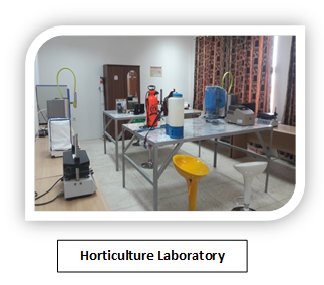
Horticulture Laboratory:
The horticulture department also needs a complete and well-equipped laboratory.
Afghanistan National Agricultural Sciences and Technology University have Arranged 50 percent of the lab equipment. It will be 100 percent complete next year.
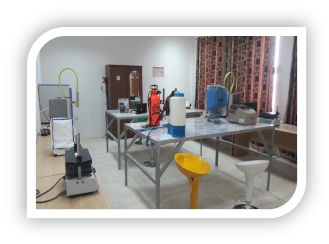
Plant pathology Laboratory:
The laboratory is affiliated with the Department of Plant Protection. It is inactive for now and will start operating next year Inshallah.
The above mentioned active branches are fully ready for work. And newly donated laboratory equipment has been transferred to the relevant departments. The laboratory of the National University of Agricultural Sciences and Technology of Afghanistan is ready to be built and utilized with the financial and technical support of its administration and other donors. Laboratory technicians with their experience have continued their work in difficult conditions for the healthy training of the young generation of the country and so far they have taken soil samples from different provinces and imparted them to the students in different soil experiments. Have instructed.
The laboratory of the National University of Agricultural Sciences and Technology of Afghanistan has performed various soil and plant analyzes using state-of-the-art machinery. The laboratory seeks to expand the scope of research in its scientific and practical field. Thus, it plays a vital role in strengthening the national economy, as agriculture based on research and tests leads to less waste and better yields. The following machinery is currently in operation in the laboratory. With its help, various soils can be analyzed.
Available Machinery
|
No |
Item Name |
No |
Item Name |
No |
Item Name |
|
1 |
AAS |
9 |
Water Bath |
17 |
IR thermometer |
|
2 |
Spectrophotometer |
10 |
Thermometer |
18 |
Scale |
|
3 |
Flame Photometer |
11 |
water Distillatory |
19 |
Stirrer |
|
4 |
pH Meter |
12 |
Spade |
20 |
Seed moisture tester |
|
5 |
Refrigerator |
13 |
Seed Counter |
21 |
Muffle Furnace |
|
6 |
Oven |
14 |
Sieve Shaker |
22 |
Sieve Shaker |
|
7 |
Microwave |
15 |
Ec meter |
23 |
|
|
8 |
Centrifuge |
16 |
Penetrometer |
24 |
|

Lab technicians working on (Atomic absorption spectrophotometer)
This machine analyses up to 60 elements especially micro elements in both soil and plant

Spectrophotometer: it analyses phosphorous in both soil and plant

Flame Photometer: this machine Analyses potassium
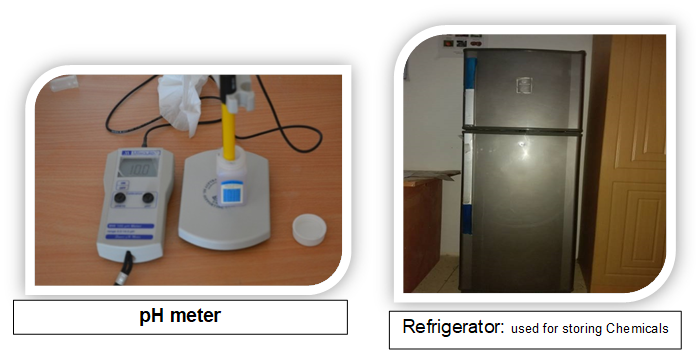
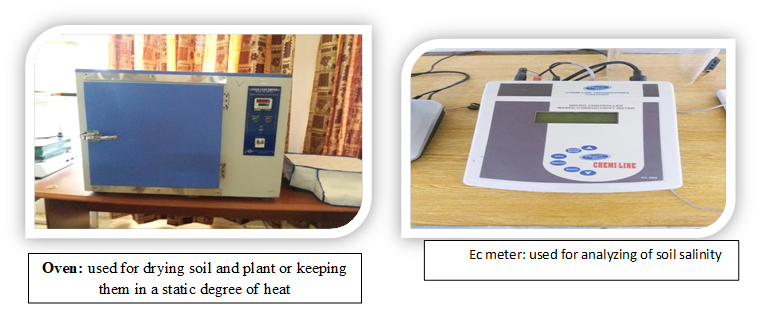
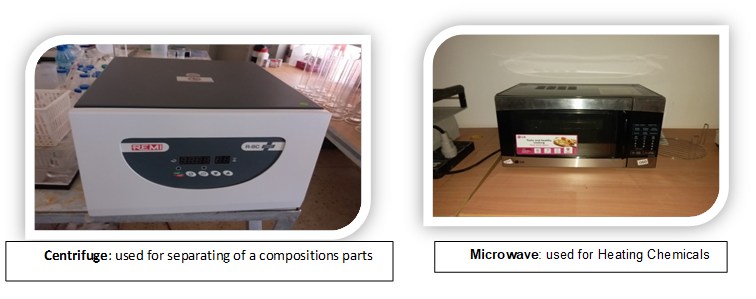
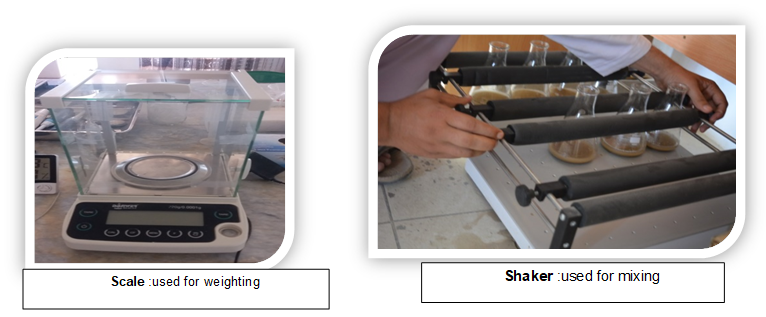
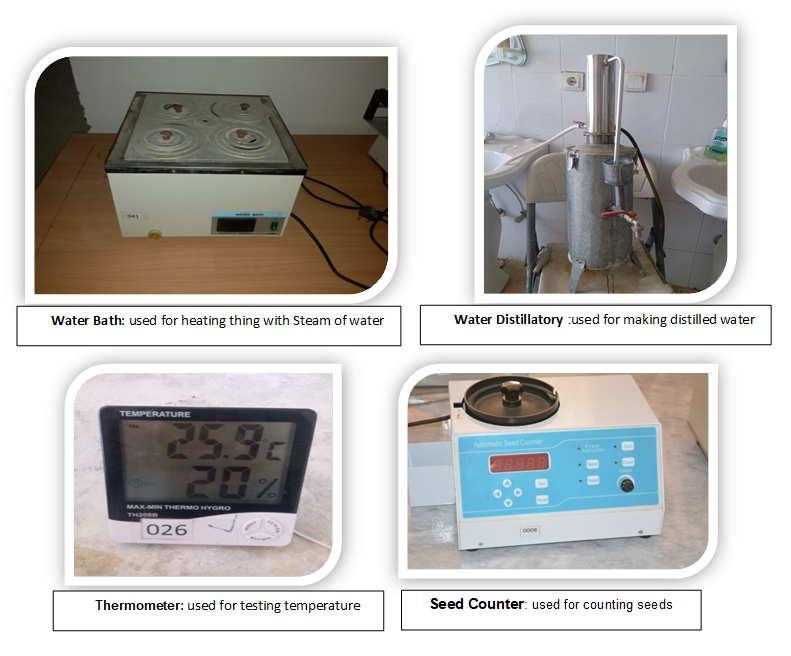
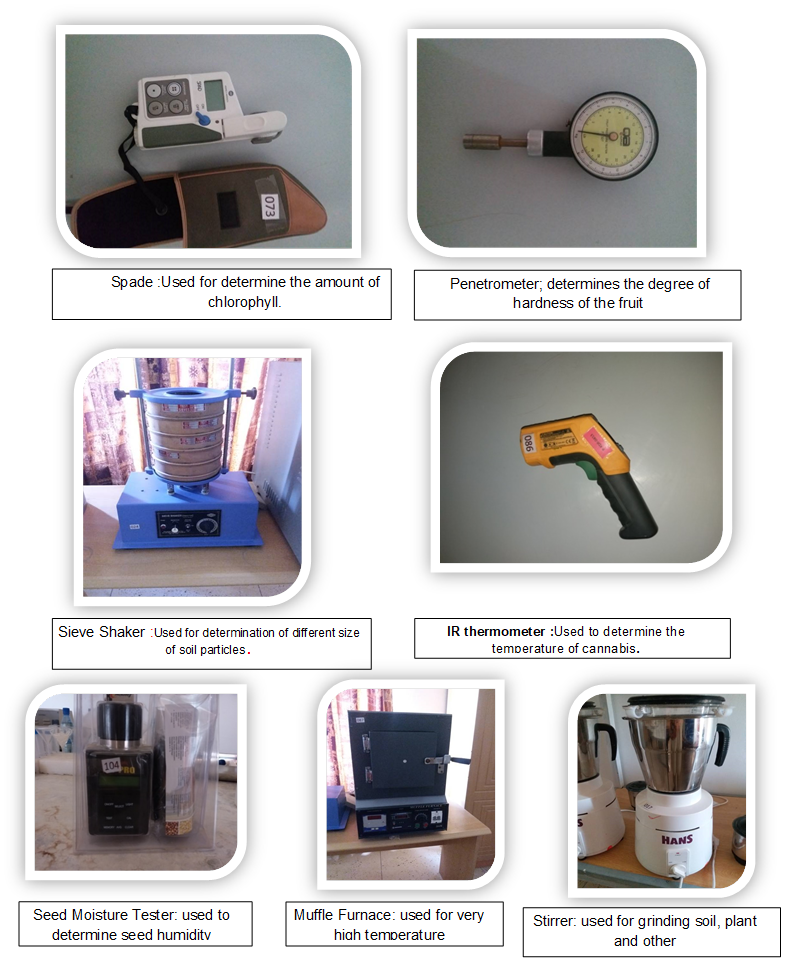
The Afghanistan agriculture science and technology university’s lab has done a lot in the soil. These Activities are not only in Kandahar but around all the country: Kabul, Herat, Jalal Abad, Khost, Nimroz and other. Here are some examples.
-
Testing soil of Kabul, Herat, Jalal Abad, Khost, Nimroz and other provinces for national soil map.
-
Testing soil of students, lecturers and farmers.
-
Processing of soil, like drying, sieving, packing and labeling.
-
Making data base for storing the data.
-
Making posters of lab activities.
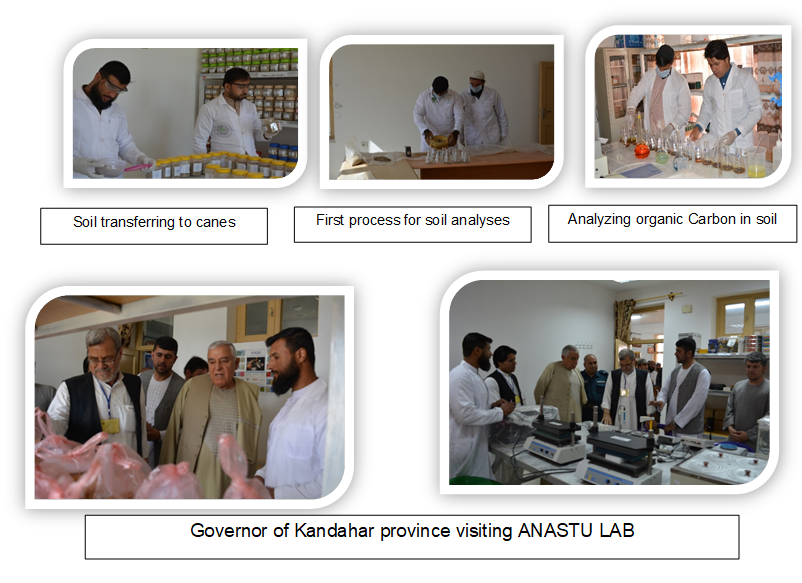
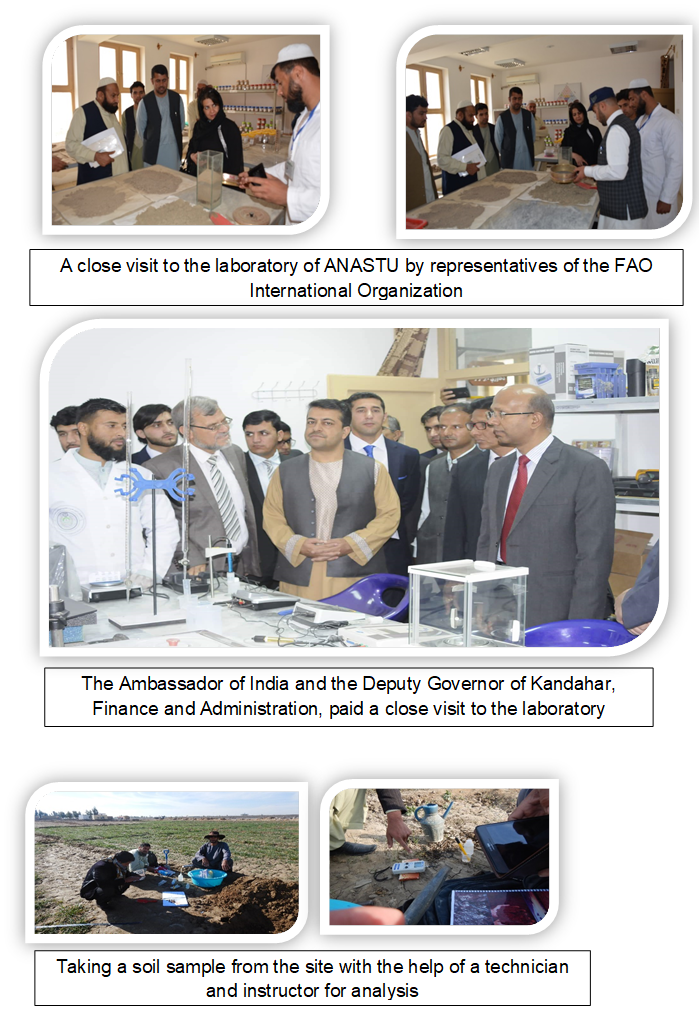
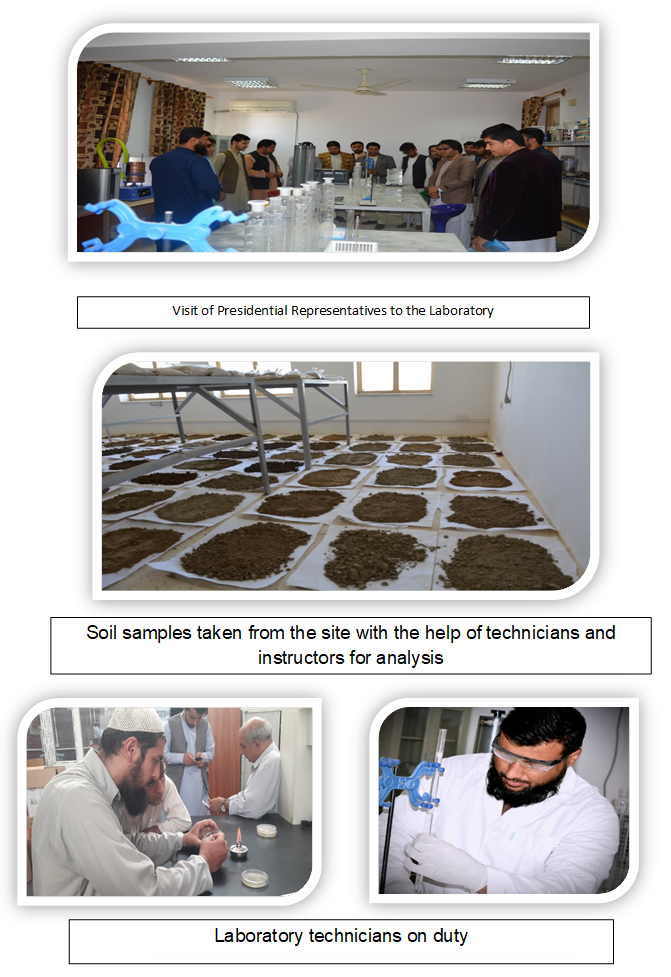
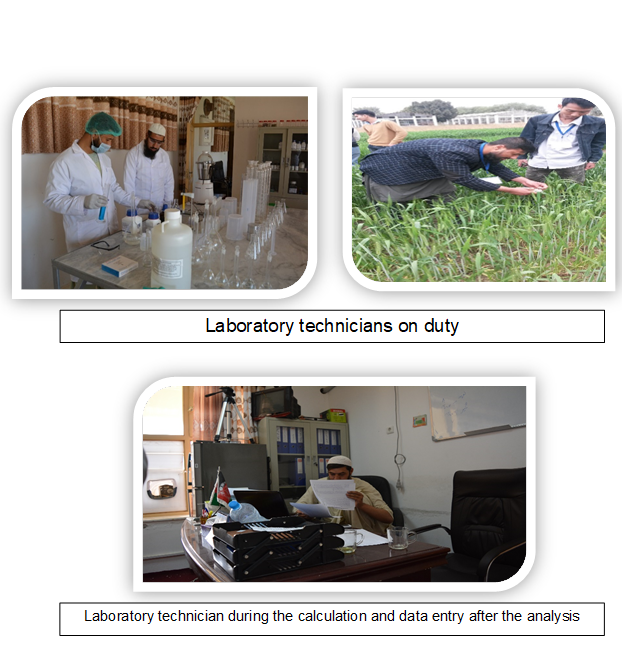
Laboratory tests conducted by the Afghanistan National Agricultural Sciences and Technology University
of The laboratory of the Afghanistan National Agricultural Sciences and Technology University is now able to perform the following tests in the soil with the help of modern machinery.
|
No |
Macro nutrient |
Micro nutrient |
And other |
|
1 |
Calcium |
Boron |
O.M |
|
2 |
Carbon |
Sodium |
WHC |
|
3 |
Magnesium |
Zinc |
CEC |
|
4 |
Nitrogen |
Iron |
CaCo3 |
|
5 |
Phosphorus |
Manganese |
pH |
|
6 |
Potassium |
|
EC |
|
7 |
Sulfur |
|
Texture |
|
8 |
|
|
structure |
|
Types and numbers of tests |
Sample figure |
province |
no |
|||||||||||||||||
|
TEXTURE |
EC |
pH |
Fe |
Zn |
Mn |
Cu |
CaCo3 |
WHC |
CEC |
Sulphur |
BORON |
K |
Bulk density |
P |
Organic matter |
Organic Carbon |
||||
|
315 |
302 |
302 |
307 |
307 |
307 |
307 |
274 |
308 |
30 |
307 |
123 |
413 |
114 |
261 |
308 |
308 |
380 |
kandahar |
1 |
|
|
125 |
121 |
121 |
123 |
123 |
123 |
123 |
124 |
134 |
14 |
116 |
29 |
126 |
45 |
123 |
90 |
90 |
134 |
Khost |
2 |
|
|
45 |
45 |
45 |
45 |
20 |
40 |
45 |
Nangarhar |
3 |
||||||||||||
|
43 |
43 |
43 |
43 |
3 |
32 |
43 |
bamiyan |
4 |
||||||||||||
|
14 |
14 |
14 |
14 |
4 |
7 |
15 |
Takhar |
5 |
||||||||||||
|
223 |
223 |
223 |
223 |
97 |
223 |
Kabul |
6 |
|||||||||||||
|
50 |
50 |
50 |
50 |
17 |
32 |
32 |
50 |
Herat |
7 |
|||||||||||
|
16 |
16 |
16 |
16 |
9 |
16 |
16 |
16 |
Nimroz |
8 |
|||||||||||
|
52 |
52 |
52 |
52 |
30 |
36 |
52 |
Balkh |
9 |
||||||||||||
|
3 |
3 |
3 |
3 |
3 |
Sarobi |
10 |
||||||||||||||
|
64 |
63 |
63 |
64 |
64 |
64 |
64 |
64 |
62 |
63 |
27 |
62 |
64 |
128 |
128 |
64 |
ANASTU |
11 |
|||
|
1 |
50 |
50 |
41 |
41 |
41 |
41 |
1 |
1 |
1 |
2 |
2 |
2 |
50 |
other |
12 |
|||||
|
505 |
536 |
536 |
981 |
981 |
981 |
981 |
462 |
505 |
127 |
486 |
440 |
650 |
159 |
450 |
528 |
528 |
7510 |
total |
||
|
9836 |
Total Tests |
|||||||||||||||||||
Rules of self-protection in laboratory
- The purpose of the experiment must be known.
- Experiment hazards should be known to every one before the experiment is to avoid any problem during chemical use.
- The performer of the experiment must be a professional and familiar with laboratory equipment, and have complete control over the experimental approach.
- Students should know all the names of materials and equipment of the experiment before the experiment is conducted and should know the methods of use.
- Determine the amount of material used, not less nor more than its amount.
- Experimental equipment should be placed correctly.
- Experimental equipment should be used during the experiment.
- The experiment should be performed in a laboratory area visible to all students.
- Listen carefully to the instructor's words and act accordingly to avoid facing any problems later.
- Wear protective goggles to the end of the experiment.
- Do not eat, drink, and smoke in the lab.
- Ask the relevant technician regarding each equipment.
- Do not hold the mouth of the test tube towards yourself or your classmates while heating the chemicals.
- Read the signs written on the chemical bottles carefully so that you don't make a mistake and get hurt.
- Glass containers should be carefully moved from one place to another.
- Always remember First Aids box, Fire extinguishers and eye washing areas.
- Relevant equipment and chemicals should be placed regularly after the experiment is done.
- After the experiment, the place of the experiment should be cleaned.
- Always ware Lab coat during the experiment.
- Always ware Lab shoes before entering the lab.
- Students should only be present in the experiment room not in other lab rooms or corridors.
- Switch off all phones during the experiment.
- Don’t do any experiment on your own and always write the result of the experiment at the end.
- Beware of illiteracy.